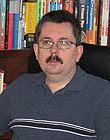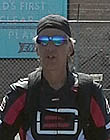|
|
This topic comprises 2 pages: 1 2
|
|
Author
|
Topic: Leave the machine on or off at the end of the night?
|
|
|
|
|
|
|
Steve Guttag
We forgot the crackers Gromit!!!

Posts: 12814
From: Annapolis, MD
Registered: Dec 1999
|
 posted 04-30-2011 02:15 PM
posted 04-30-2011 02:15 PM




My opinion on the matter is...
Anything that moves air is also a "dirt-pump" too. So how clean the room is will greatly affect how filthy the equipment gets from the act of just leaving it on. This is particularly true of the projectors. I recently cleaned a projector that was in operation only 6-months. And despite all of the filtering of the projector, I was able to improve the light by over 6.4% by cleaning JUST the Dolby filter wheel! If you add up the cleaning of the other glass/mirror items...the light improvement was into the double-digits. The booth was not particularly filthy at all, either. The back of the lens proved to be a BIG dust/dirt collector, just like with film. These machines were turned off each night. One could expect twice as much dirt had they been left on the extra 12-hours just to make noise a night.
On the server side of things, you don't have an optical element BUT I have found servers absolutely clogged full of dirt too...which compromises the ability to remove the heat, which will lead to failure. On stupid thing most companies do is have their air flow to be from the Front to the Back of the equipment that is racked...which is dumb. The air INSIDE of the rack is controllable. QSC got this right, they pump from rear to front. Thus, one can put filters on INTAKE blowers to pressurize the rack (or pedestal) and let the equipment suck on nice filtered (and cool) air, then spit it out as warmer air for the booth's HVAC to deal with (heat load). The other drawback to the preset designs is that each piece of equipment blows its high air into the rack to help heat up the other equipment...just plain dumb.
That is the dirt side to the equation. Then there is the operational side. I've found that it is best to have at least a regular schedule of rebooting the equipment. It really seems to clear out problems before they start showing themselves. A reboot will often cause the equipment to purge memory, check the time/date and start things up fresh. So, even if you don't want to turn things off every night, I suggest you reboot everything at least once a week.
At present, all of my customers turn the DCinema equipment off nightly that are NOT part of a NOC. Most NOCs will require it to remain on 24-hours so they can monitor it and possibly handle updates during the down-hours. As such, I recommend having a regular schedule where you merely reboot the equipment periodically...once a week is sufficient and in fact, once a month would probably be okay too but harder to keep track.
-Steve
| IP: Logged
|
|
|
|
|
|
|
|
|
|
|
|
|
|
|
|
|
|
|
|
|
|
|
|
|
|
All times are Central (GMT -6:00)
|
This topic comprises 2 pages: 1 2
|
Powered by Infopop Corporation
UBB.classicTM
6.3.1.2
The Film-Tech Forums are designed for various members related to the cinema industry to express their opinions, viewpoints and testimonials on various products, services and events based upon speculation, personal knowledge and factual information through use, therefore all views represented here allow no liability upon the publishers of this web site and the owners of said views assume no liability for any ill will resulting from these postings. The posts made here are for educational as well as entertainment purposes and as such anyone viewing this portion of the website must accept these views as statements of the author of that opinion
and agrees to release the authors from any and all liability.
|

 Home
Home
 Products
Products
 Store
Store
 Forum
Forum
 Warehouse
Warehouse
 Contact Us
Contact Us




 Printer-friendly view of this topic
Printer-friendly view of this topic








![[Razz]](tongue.gif)
![[Big Grin]](biggrin.gif)




![[thumbsup]](graemlins/thumbsup.gif) ! Ditto for the projector's electronics section and the local network switch. You should however have at least a 1KVA UPS or larger. I typically use a 1.6kva Tripp Lite that runs about $800.00 on line. It'll run the server, switch and projector electronics for about 15 min. before it shuts down. Give plenty of time to go around a large multiplex and do proper power downs on the gear. ALso filters out all the nasty stuff that might come in on the AC line.
! Ditto for the projector's electronics section and the local network switch. You should however have at least a 1KVA UPS or larger. I typically use a 1.6kva Tripp Lite that runs about $800.00 on line. It'll run the server, switch and projector electronics for about 15 min. before it shuts down. Give plenty of time to go around a large multiplex and do proper power downs on the gear. ALso filters out all the nasty stuff that might come in on the AC line.



